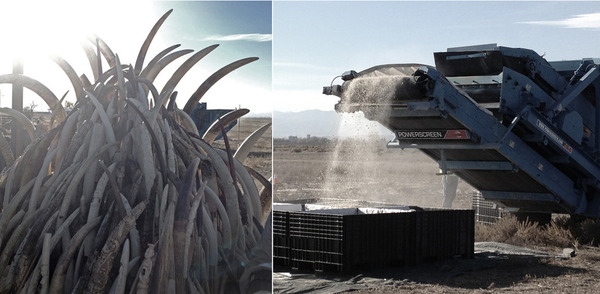
by Nick Brandt
It was an important but sad moment - to see the tusks of so many hundreds and hundreds of elephants ground up into deliberately valueless dust - elephants whose lives were lost for nought, like all the millions of others whose lives over the decades have been brutally and needlessly extinguished for their ivory....
Yesterday, November 14, on behalf of Big Life Foundation, I attended the U.S. Fish and Wildlife Department's Crushing of the U.S. confiscated illegal ivory stockpile. This follows on, in recent times, the crushing of ivory stockpiles in Kenya and Gabon in Africa, and the Philippines.
Yesterday was the first step in what will hopefully lead to a more actively engaged United States entering the battle to stop the out-of-control slaughter of Africa's last elephants. In and of itself, this ivory crush will make no difference to the ivory demand. But it is an important start.
The U.S. now needs to more urgently try and engage all countries to more forcefully impose the ban on illegal ivory. But the U.S. needs to do something else to make a dent in the killing :
What many of us don't realize is that after China, the United States is actually the second largest importer of illegal wildlife parts. Not ivory specifically, but all illegal wildlife parts. The United States cannot hope to ask China to do the right thing and ban ivory whilst it allows the sale of 'legal' ivory to continue in this country.
IFAW and WWF are playing a major part in the attempt to add pressure to Congress to impose a moratorium on the sale of ivory in the United States. Please go to http://www.ifaw.org/united-states/get-involved/take-action-fight-wildlife-trafficking and add your names to the petition to Congress.
For those questioning how the ivory crush might alter the demand for ivory - this ivory, gathered over many years, would never ever have found its way back onto the market, and is a meager amount within the global scheme of things, and thus would never play a factor in either increasing or decreasing the demand in ivory.)
